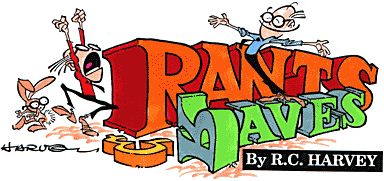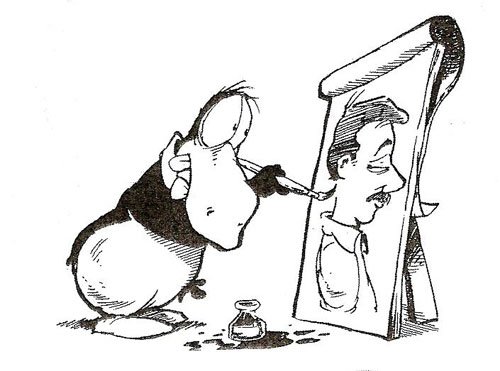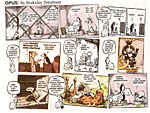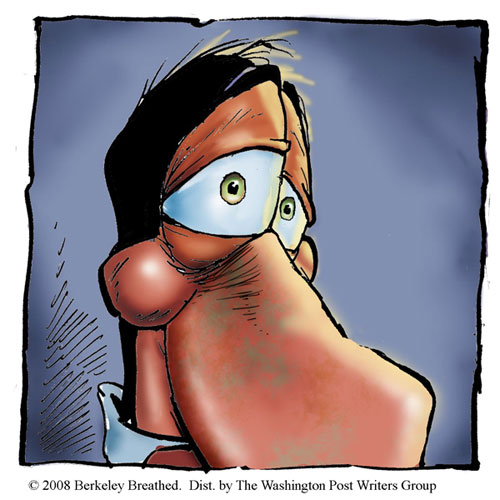 |
|
OPUS 231 (October 11, 2008). A startling announcement from the Rancid Raves Broken News Department: Berkeley Breathed has, once again—for the third (and perhaps final) time—decided to discontinue his syndicated comic strip, leaving Opus languishing in prison. That’s the whole content this time, kimo sabe, which we begin with our customary reminder: don’t forget to activate the “Bathroom Button” by clicking on the “print friendly version” so you can print off a copy of just this lengthy installment for reading later, at your leisure while enthroned. Without further adieu, then, here we go—
Press Release from Washington Post Writers Group (almost verbatim) BREATHED TO END OPUS ON NOVEMBER 2 Pulitzer Prize-winning cartoonist Berkeley Breathed announced Monday, October 6, the end of his 30-year comic strip career. The last Opus, the Sunday-only "sequel" strip to Outland and Bloom County, will appear in newspapers on November 2. Twice before Breathed terminated lucrative comic strips, but this time, he insists, is for good. Said he, satirical tongue, as usual, firmly lodged in at least one cheek: "With the crisis in Wall Street and Washington, I'm suspending my comic strip to assist the nation. The best way I can help is to leave politics permanently and write funny stories for America's kids. I call on John McCain to join me." Writers Group Editorial Director and General Manager Alan Shearer spoke to the cartoonist's legacy: "Berkeley Breathed took comic strip artistry to places it had never been. He pushed all sorts of topical and stylistic envelopes. In the process, he gained millions of fans and influenced a generation of new cartoonists looking to do the same. Almost nothing was sacred. It was an unforgettable voyage, and I feel privileged to have been along." Returning the sentiment, Breathed said, "The Writers Group had the vision—and the patience—for my work to flourish. Few would have." Comics Editor Amy Lago has read the final Opus strips. "The remaining four are poignant, with reference to Breathed's 'greatest hits' strips, but they're also funny. His ability to weave those emotions together is what makes Breathed such a great cartoonist, and it's why he will leave a bigger hole on the comics pages. Both figuratively and literally," she joked, referring to Opus' half-page-mandated size. Ever the innovator, Breathed is ending the strip with a contest asking readers to guess the pudgy penguin's ultimate fate. To preserve the integrity of the contest, Lago said, the actual ending will not be seen in newspapers, but will be available only on the Internet. She would not provide details but noted the irony in this decision on Breathed's part. When Breathed brought Opus back in November 2003, he would not allow the strip online, preferring to give newspapers the sale right to reproduce the work—which meant readers had to buy a newspaper to read it. The ban was lifted a year later. End of Press Release.
***** I can’t say that I’m surprised about the ban being lifted. Breathed talks a good game, but he changes his mind as often as an infant his swaddling clothes. Breathed’s strategy in 2003 when he re-launched the strip he’d abandoned eight years before was to appear to be coming to the rescue of the foundering newspaper industry. He was giving newspapers an exclusive that would help them. Confining his creation to the print medium would, in his mind, boost newspaper sales for every newspaper that ran Opus: all of Breathed’s millions of fans would have to buy newspapers. That’s what he wanted newspapers to think; and it was canny tactics and possibly a reasonable scheme. In exchange, he was demanding that Opus be published in a half-page format. Initially, that meant the strip consumed a half-page of the Sunday comics, often shoving out of the paper as many as two other strips. But eventually, that requirement morphed, too. The so-called “half-page format” could be preserved at a smaller size than half-a-page: the strip could be published at less than the half-a-page dimension, but the “format,” the number and arrangement of panels, had to be kept intact. My local paper, the Rocky Mountain News, runs Opus on the same page with four other strips, taking much less than a half-page. Another tactical retreat. Born 1957, Breathed shocked the cartoonist fraternity by quitting not one but two popular comic strips before he was forty years old. To that astounding record, we can now add a third, abandoned in his 51st year. Attending the University of Texas, Breathed created for the campus newspaper a comic strip called Academia Waltz (1978-79), the popularity of which attracted syndicate attention. Renamed Bloom County, the strip, which looked and laughed a lot like Garry Trudeau’s Doonesbury, may have benefitted shortly after its launch on December 8, 1980, from the sabbatical that Trudeau took two years later (discontinuing Doonesbury, January 1983-September 1984), many newspapers substituting Breathed’s strip for Trudeau’s. Breathed’s pen didn’t drip with as much vitriol as Trudeau’s, and he aimed more often at social mores or popular culture than politics, but his strip looked a lot like Doonesbury and appealed to many of the same readers as Trudeau’s had. And Breathed was not above enhancing the similarity by borrowing a few comedic devices from Trudeau—the kid having a conversation with his image in the bathroom mirror, for instance. The denizens of Bloom County included several precocious children, a male chauvinist, and a cool paraplegic, but the character who readers took to their hearts was Opus, a wistful penguin with gentle usually uncomprehending opinions on most aspects of the human condition. Again like Trudeau, Breathed won a Pulitzer Prize (in 1987) for editorial cartooning in his strip. As the strip gained in circulation, Breathed agitated for ownership of the feature, but when he acquired it, he discontinued the strip (on August 6, 1989), offering in its place a Sunday-only feature called Outland, which was to have starred a waif named Ronald Ann but into whose orbit Opus soon spun, followed by a number of the Bloom County stalwarts—Bill the Cat, Steve Dallas the chauvinist, and an insistent cockroach. Outland started September 3, 1989 but enjoyed only modest success compared to the 1,300-paper circulation of Bloom County at its peak. Breathed ended it in 1995 and explained his early retirement by saying, “A good comic strip is no more eternal than a ripe melon.” He was also critical of the steadily shrinking space allowed to comic strips by newspapers and said he wanted to quit while he was at the peak of his success and ability. For the next several years, Breathed busied himself by producing children’s picture books, screenplays and novels. His first novel for young readers, Flawed Dogs, is due out soon. In late May 2003, he made a surprise—that is, unannounced—appearance before the National Cartoonists Society when it convened in San Francisco over Memorial Day weekend. Breathed’s presentation consisted of a recital of 17 pieces of advice he offered to novice cartoonists—and the 17th was “don’t quit when you’re at the peak of your success.” From this, most of us concluded that Breathed regretted quitting—giving up the daily pulpit for fulminating about the passing foolishness of American social and political life—although he didn’t miss at all the pressure of meeting deadlines. Presumably, when Breathed stopped doing the 7-day Bloom County in favor of the once-a-week Outland, he did so in order to escape the garroting grip of deadlines that comes with a daily strip. Another of his 17 pieces of advice warned young cartoonists about the unyielding demand of deadlines, and to dramatize his point, Breathed said: “I have literally jogged two miles in waist-deep Iowa snow at 4:30 a.m. trying to get my work on the first plane out of Cedar Rapids so as to make deadline. In the proverbial blizzard. I have fallen asleep speeding down the mountains of Colorado [from where he lived in Evergreen] trying to get to Denver at the same time in the morning. While my head is stuck out the window into the sub-zero air, one hand holding my eyelids open in the vain hope that that will keep the driver awake. It won’t. And it didn’t. I have hopped aboard planes with my art, finished it en route to D.C., given them to a cabbie to deliver to the syndicate, and then flown back home. About a dozen times.” With Garry Trudeau sitting in the back of the room, Breathed also cautioned against swiping other cartoonists’ shtick, whether consciously or not. (He always said he was unconscious at the time; hard to believe, but there it is.) And he expressed regret at having forsaken his penguin, saying, in effect, that he hadn’t realized until he’d stopped doing his strips how profound an inspiration, how great a gift, Opus had been and therefore how foolish his creator had been to desert his creation. He clearly missed the platform that a nationally distributed comic strip provided for commenting on the issues of the day. With the dubious benefit of hindsight, Breathed’s surprise presentation before his colleagues in San Francisco might be interpreted as the first step in an elaborate dance of insinuating himself and his penguin back into the fellowship: within a few months, we heard that he would start, that November, another Sunday-only strip bearing the penguin’s name, for which he demanded an entire half-page in the Sunday funnies, an act of arrogance that Breathed compounded by suggesting that newspapers would have ample room to accommodate his demand if they’d only drop all the “legacy strips,” those worn-out relics, as he put it, being hacked out by clueless committees or bored relatives of dead cartoonists. His attitude did not ingratiate him to the inky-fingered fraternity. We had all enjoyed his San Francisco diatribe but we scarcely imagined that it was merely the preamble to a call for the death of a dozen or more comic strips produced by long-standing and often beloved members of NCS. At the time of Opus’s launch, I was dubious about its possible success. There was a good deal of hue and cry about the return of Bloom County’s creator. But it wasn’t Bloom County that was returning. And judging from the short and frustrating history of Outland, I wasn’t optimistic that Breathed’s brand of topical humor will work on a once-a-week basis: for that, you need a continuous, seven-days-a-week presence in the American psyche. Bloom County charmed us in part because it accumulated, day by day, an ambiance—a combination of the characters' personalities and their various reactions to society around them—that was soon both familiar to us and satiric in its comment on our culture. We could expect Steve Dallas to say something loutish when approaching the schoolmarm Bobbie; we knew Binkley kept his anxieties in the bedroom closet; we knew Milo would use his newspaper position to persecute politicians. Every day's strip arrived freighted with what had gone immediately before, and our memory of it was so sharp and clear that all of its weight imparted to each installment a momentum that gave every barb Breathed flung an impact it couldn't have without the accumulated history. Whether that sort of ambiance could be created and then sustained with just one appearance every seven days remained to be seen. But this was Opus, the bird we loved, and so I rooted for the winsome flightless fowl—even though I think Breathed has let his beak get much much too big. (Geez, he's no longer cute, Berke.) And I rooted for Breathed, too, even though he ofttimes behaves like a self-absorbed lout, much in the manner of the aforementioned Steve Dallas. As recently as last June, Breathed was still passing himself off as a cartoonist dedicated to exploiting the daily comic strip. In the second issue of Stay Tooned in a roundtable of Q&A, Breathed holds forth in his now familiar self-satirical manner. Asked by Brock Heasley, creator of Superfogeys, whether he ever thought of quitting the daily strip and doing something else, Breathed answered with one of his patented self-deprecating jibes: “I hope that’s a joke. You note that I started this craze [of quitting a successful syndicated comic strip] in 1989. Bill Watterson and Gary Larson were soon to follow. Nobody else but us have been—let me think of a gentle word—stupid enough to give up the printing press for money, which a successful comic strip is.” (The second issue of Stay Tooned is available now at staytoonedmagazine.com for a mere $10; subscriptions are also offered there.) To justify the excessive allotment of space on Sundays, Breathed promised he would produce spectacular art in Opus, but I can’t say I ever saw much evidence of it. In his children’s books, on the other hand, Breathed did much better, and his success there lent credence to his claims for the Sunday strip in promotional materials. Presumably the yearned-for circulation that would have given him a huge audience didn’t materialize either: approaching its expiration, Opus is running in about 200 papers, a respectable number but hardly robust enough for a professional gadfly seeking to impinge upon the world. Breathed
began preparing the way for Opus’ demise weeks ago in strips
that alluded to “the end” and “meeting the maker”
and other ambiguities. In September, Opus was arrested by operatives
of the Department of Homeland Security and confined to an animal
shelter when he admitted that he was in the country illegally. Behind
bars, he’s been reliving memorable scenes from his past. Oddly, we had another glimpse through the glass darkly in the spring of 2007 when Breathed, who can’t seem to make up his mind which of several professions to stick with, was caught muttering about the impending “death” of Opus when interviewed by Mike Shea at the Texas Monthly. The topic of the interview was ostensibly Breathed’s latest children’s book at the time, Mars Needs Moms, but when he was asked what projects were on the horizon, Breathed said: “Three—a novel; two of my books in development at Disney; and Opus’s death, which approaches.” By “Opus,” Shea pressed, did the cartoonist mean the comic strip or the character? “I mean the death of Opus literally,” said Breathed, “as told in the comic, which means the suspension of the feature (no dates set as of yet).” Shea: “Are you serious about killing off Opus in the strip?” Breathed: “Yes, but my wife would leave me, she reports. I have to factor this in.” Shea: “Do your publisher and newspapers know this?” Breathed: “They know that all good things come to an end. I’d like to see Opus go out with George Bush, both headed into the sunset.” At the time (R&R, Op. 205), I assumed that Breathed was being cute rather than coy: one could assume, from the context of this exchange, that he was alluding to the imminent demise of print newspapers, not just his strip or character, both of which would cease with the expiration of hardcopy journalism. But I couldn’t say for sure. The verdict is still out about the alleged death of newspapers. But it doesn’t surprise me that Breathed is going to abandon his flightless fowl once again. He no doubt thought his life would be easier with just a Sunday strip. While his life was probably easier, it was not as festooned with fame as it had been under the 7-day regimen of yesteryear. Nor was it as lucrative. With both ego and purse hurting, Breathed once again discovered, as he had with Outland, that a strip without notoriety and circulation isn’t enough to sustain his continuing interest. So now, he’s giving it all up. Again. Not that it was easy to do. In an interview with National Public Radio, Breathed said that while “he is not usually sentimental about his characters, he found himself ‘unrealistically emotional’ about drawing the final strip, taking pains to make sure the penguin’s last pose was perfect. Creating Opus for the last time, he said, was like experiencing the passing of his kids’ childhood: ‘As I drew him finally at the very end, I knew that that was the end—[Opus’] childhood was gone. ... It took me a few minutes. I had to pull myself back together again and face the fire.’” Breathed added that he “has always struggled to maintain the balance between lightness and darkness in his comics—and himself. ‘I’m more happy when I’m leaning towards the Walt Disney, but I can’t resist the ranting of a Michael Moore,’ he said.” This time, Opus is gone for good, Breathed insisted. “I’ll be leaving Opus in a way that it should be very clear that this time, there’s no going back home.” Then again, Bill the Cat died of acne in Bloom County only to reappear as a clone in Outland. Who can say? I am, admittedly, being cynical and probably unfair to Breathed. Despite the askance of my glance, I don’t mean to be nasty about Breathed and his choices. His comedic and satiric achievements over the 20 intermittent years he’s worked the field have been impressive if not particularly innovative in form. He’s one of the good guys, not one of the bad guys. His motives are doubtless personal rather than venal. He’s probably exhausted rather than calculating, and he has other irons to fry but not enough time to bring them to a boil unless he gives up Opus. No one should expect a cartoonist to expend time and talent on an enterprise that isn’t rewarding emotionally if not financially. Breathed is, after all, a child of the 20th century’s last half, during which we’ve seen several stunningly talented syndicated cartoonists elect not to spend their entire lives at the drawing board, chained to deadlines. Bill Watterson. Gary Larson. Frank Cho. Aaron McGruder. Michael Jantze. And now, again, Breathed. These defections may be symptomatic of the times. Lifelong indentured servitude seems a thing of the past. And maybe that’s just fine. In the realm of funnybooks, we’re getting a superior product on a mini-series basis—and probably because of the mini-series as a genre. Hellboy shows up every now and then, whenever Mike Mignola gets a good inspiration, we may suppose, instead of plodding on, issue after clockwork issue, in order to obey the dictates of a publication schedule rather than the impulse of creative inspiration. Ditto Mad Man, Michael Allred’s idiosyncratic concoction. What sloughs of inferior effort could Superman have avoided had he been featured in mini-series instead of regular, monthly titles? Then again, had the mini-series been viable back in the 1930s and 1940s, perhaps Superman would not have lasted as long as he has because he would not have been a presence long enough or steadily enough to nurture a following. Who can say? Not me. Not right now. Right now, it’s enough to pause a bit to celebrate the evolution of cartooning venues that stimulate creativity rather than stultify it through sheer clock-punching regularity. But before we dash off, here’s another fragment of Shea’s interview: Breathed is a delightful if cynical wit. Insightful, too. Commenting on his new children’s book, Breathed says that it is his “first fully digital paintings. It’s a revelatory artistic experience, making a computer create artwork, but a deeply distressing one as well, as at the end of the day, you’re not holding a painting. It is only light. I haven’t quite come to terms with this.” Neither have many colorists. As I mentioned before, some comic book pages are colored much too dark, probably because the colorist is looking at his/her work on a computer, and the light, coming from “behind” the drawings, illuminates the colors, making them seem brighter; but when printed in ink on paper, the colors, once so bright and gleaming, are dark, too dark, sometimes, obscuring the artwork they are intended to embellish. As for Breathed—Big THANQUES, Berke, for Opus and Steve and all the rest. It was a long, strange and interrupted ride but worth virtually all of its minutes.
To find out about Harv's books, click here. |
|

send e-mail to R.C. Harvey Art of the Comic Book - Art of the Funnies - Accidental Ambassador Gordo - reviews - order form - Harv's Hindsights - main page |


